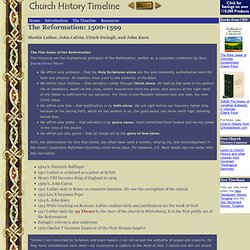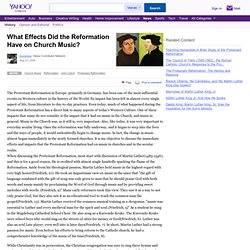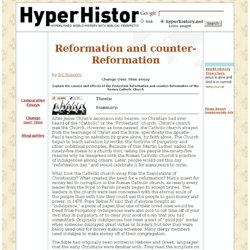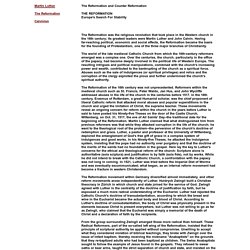

Welcome to Concise History of Western Music, 3rd Edition. Church History Timeline: 1500-1599 - The Reformation. The Five Solas of the Reformation The following are the foundational principles of the Reformation, written as a corporate confession by Rev.

David Owen Filson. We affirm sola scriptura – that the Holy Scriptures alone are the sole inherently authoritative norm for faith and practice. All tradition must yield to the authority of the Bible. We affirm solus Christus – that salvation comes through Christ alone. SDG, the abbreviation for Soli Deo Gloria, has often been used a symbol, rallying cry, and encouragement in the church (especially Reformed churches) since those days. 1504 b. “Unless I am convicted by Scripture and plain reason—I do not accept the authority of popes and councils, for they have contradicted each other—my conscience is captive to the Word of God. Luther before the Diet of Worms, April 17, 1521.
And now for something completely different... 1521 Luther is excommunicated 1525 The Bondage of the Will. Buy these books from Christian Book Distributors For further study. Effects of Reformation Period on Church music. The Protestant Reformation in Europe, primarily in Germany, has been one of the most influential events on Western culture in the history of the World.

Its impact has been felt in almost every single aspect of life, from literature to day-to-day practices. Even today, much of what happened during the Protestant Reformation has a direct link to many aspects of today's Western Culture. One of these impacts that many do not consider is the impact that it had on music in the Church, and music in general. Music in the Church was, as it still is, very important. Also, like today, it was very important to everyday secular living. When discussing the Protestant Reformation, most start with discussion of Martin Luther(1483-1546), and this is for a good reason. While Christianity was in persecution, the Christian congregation was sure to sing there hymns and psalms of worship. Luther put a strong emphasis on the congregational song.
Reformation and counter-Reformation. By Rit Nosotro Change Over Time essay Explain the causes and effects of the Protestant Reformation and counter-Reformation of the Roman Catholic Church Thesis: Summary: After Jesus Christ’s ascension into heaven, no Christian had ever heard of the “Catholic” or the “Protestant” church.

What took the Catholic church away from the foundations of Christianity? The Bible had originally been written in Hebrew and Greek, languages that the early Christians were familiar with. Early efforts to reform the church included several brave men who wanted to return the Church to her former “glory in the cross.” Finally, upset with everything that had happened, on 31 October, 1517, Martin Luther threw down the gauntlet. But Luther still believed in transubstantiation, a practice that some began to question.
The reformed movement split into two parts. Multiple Choice Questions: 1. A. 2. A. 3. A. 4. A. transubstantiation b. Bibliography: Hodges, Miles H. Pollon, J.H. Effects of Counter-Reformation. The Reformation and Counter Reformation. The Reformation and Counter Reformation Europe's Search For Stability The Reformation was the religious revolution that took place in the Western church in the 16th century; its greatest leaders were Martin Luther and John Calvin.

Having far-reaching political, economic and social effects, the Reformation became the basis for the founding of Protestantism, one of the three major branches of Christianity. The world of the late medieval Catholic Church from which the 16th-century reformers emerged was a complex one. Over the centuries, the church, particularly in the office of the papacy, had become deeply involved in the political life of Western Europe. The Reformation of the 16th century was not unprecedented. The Reformation movement within Germany diversified almost immediately, and other reform movements arose independently of Luther. From the group surrounding Zwingli emerged those more radical than himself. The age of Reformation and Counter-Reformation Back to Main menu. The Counter - Reformation was.....
The Reformation was.....